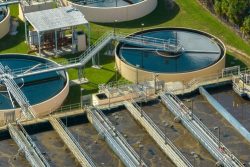Water Conservation in Industrial Operations: Sustainable Solutions for Cincinnati Businesses
 Water Conservation in Industrial Operations: Sustainable Solutions for Cincinnati Businesses
Water Conservation in Industrial Operations: Sustainable Solutions for Cincinnati Businesses
Water is essential for industrial operations, playing a significant role in manufacturing, cleaning, and other processes. However, with the increasing demand for water resources, it’s vital for businesses to adopt sustainable practices that conserve water and reduce waste. Cutting down on water usage not only contributes to environmental conservation but also helps businesses save on water bills and energy costs. In this article, we highlight some sustainable water conservation solutions that businesses in Cincinnati can implement.
1. Recycle and Reuse Water
Recycling and reusing water are excellent ways of conserving water in industrial processes. Wastewater treatment facilities can treat and process wastewater, making it safe for reuse in industrial operations. The treated wastewater can be used for cooling, cleaning, and other non-potable uses. By reusing and recycling water, businesses can reduce their water demand while contributing to environmental conservation.
2. Install Low-Flow Fixtures
Another effective way of conserving water is by installing low-flow fixtures such as faucets, showerheads, and toilets. These fixtures reduce water wastage by limiting water usage per use. This can lead to significant water savings for businesses, especially those that use large quantities of water in their operations. Low-flow fixtures also help reduce water bills, saving businesses money in the long run.
3. Conduct a Water Audit
A water audit involves assessing and analyzing water usage in an industrial operation. The audit helps identify areas where water is being wasted and determines the efficiency of water usage in the operations. After the audit is conducted, businesses can implement measures to reduce water waste and optimize usage. Water audits help businesses understand their water consumption patterns, identify leaks, and prioritize areas of maximum water usage, leading to more effective conservation strategies.
4. Harvest Rainwater
Harvesting rainwater is a sustainable water conservation solution that businesses can adopt. Rainwater can be used for cleaning, irrigation, and other non-potable uses. By capturing and storing rainwater, businesses can reduce their reliance on municipal water sources, resulting in reduced water bills. Harvesting rainwater is also environmentally friendly and can help reduce the carbon footprint of industrial operations.
5. Use Advanced Process Control
Advanced process control systems automate and optimize water usage in industrial operations, leading to significant water savings. These systems use sensors, analytics, and data to identify areas where water is being wasted and optimize water usage in real-time. Adopting advanced control systems can lead to significant water and energy savings as it reduces the wastage of both resources.
6. Implement Leak Detection Programs
Leak detection programs can help businesses identify leaks in water supply systems quickly. Identifying and fixing water leaks is essential in preventing water wastage. A leak detection program involves regular inspections, monitoring the water supply system, and fixing leaks as quickly as possible. Fixing water leaks can lead to water savings of up to 20%, according to the Environmental Protection Agency.
7. Develop Sustainable Cleaning Practices
Cleaning is an essential aspect of industrial operations, but it can also lead to significant water wastage. Developing sustainable cleaning practices such as using microfiber cloths, dry steam cleaning, and eco-friendly cleaning products can help reduce water usage significantly. These practices also contribute to environmental conservation by minimizing water pollution, reducing energy costs, and reducing the use of harmful chemicals.
In conclusion
Water conservation is vital, and industrial operations play a significant role in water consumption. By implementing the above sustainable solutions, businesses in Cincinnati can conserve water resources, reduce waste, and save on water and energy costs. Adopting sustainable practices also helps businesses meet regulatory requirements, enhance their reputation, and contribute to environmental conservation. Improved water conservation measures can also lead to increased efficiency, operational optimization, and higher employee morale as workers become actively involved in environmental conservation practices.
Got questions? Let us help! Be sure to contact our team of water purification professionals to learn more about what we can do for you!
Categorised in: Water Conservation
This post was written by admin
 Water Conservation in Industrial Operations: Sustainable Solutions for Cincinnati Businesses
Water Conservation in Industrial Operations: Sustainable Solutions for Cincinnati Businesses